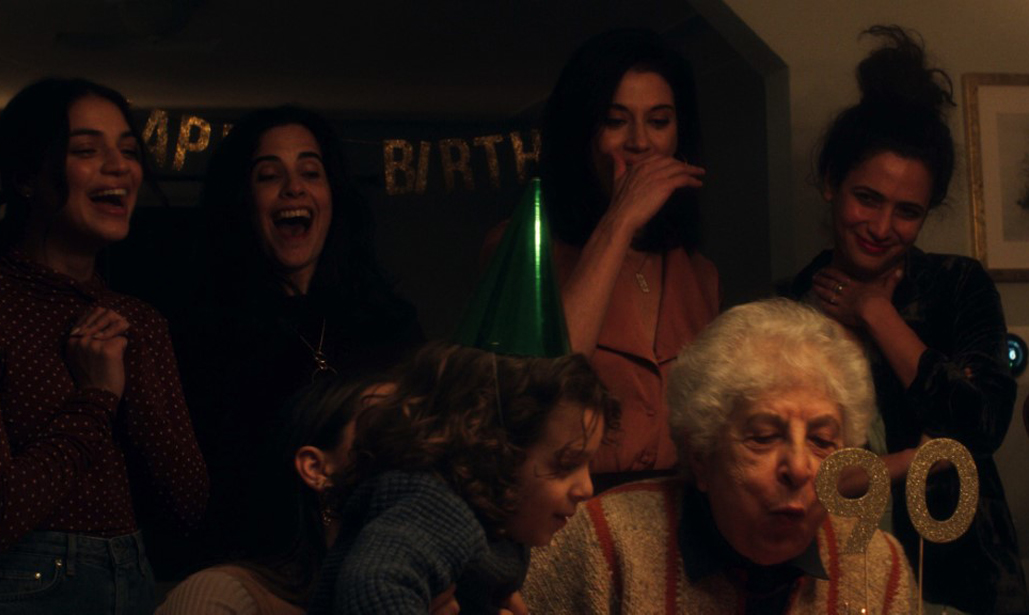Darine Hotait wanted to take a breath before taking a look at the footage for “Tallahassee.” Shot in the last weekend of 2020 before New York was shut down by the pandemic in March, the director had overseen a huge gathering of family and friends in the apartment of the film’s writer and star Hala Alyan, a crucial element in the story of a woman who has just returned from a visit to a mental health facility she’d rather keep private, and riding high on the spirit of community she’d just experienced, the prospect of working with her creative team on the edit over Zoom was hardly enticing.
“The beginning of COVID was quite traumatizing for all of us, and the idea of editing remotely was very new to me,” says Hotait, who saw her editor move to Los Angeles from New York and had to facilitate post-production for a crew all individually working on their own schedule. “The idea of editing remotely was very strange, and I [thought] let me wait until a time I could actually exist with an editor in the same room, which never happened.”
Still, if “Tallahassee” is any indication, Hotait isn’t one to let a pandemic get in the way of bringing people together, if not in person, at least in spirit and in following Mira (Alyan), who may suspect she’s being thrown to the wolves when attending the 90th birthday party for her grandmother Teta (Samia Halaby), where she is bound to be interrogated by nosy relatives about where she’s been, the director shows that no one should ever feel alone, no matter how isolated one may see themselves. While Mira doesn’t feel as if she’s helped by her sister Lara (Cherien Dabis), who has provided a specious cover story to the rest of the family about a trip to Florida, she can take some comfort in the company of her cousin’s kid (Malek Halloway), who is prone to asking plenty of questions, but blessedly none related to her specifically, and taking a walk with him around the neighborhood proves to be a breath of fresh air in more ways than one outside of an apartment that’s obviously filled with love for her, but can’t help but seem stifling when all she senses is judgment.
Making its premiere virtually this week as part of the BlackStar Film Festival, “Tallahassee” extends that clarity to audiences while bringing home the feeling of celebration that largely eludes Mira at her grandmother’s birthday and on the eve of its debut, en route to being presented online later this fall via The New Yorker, Hotait spoke about the project that has been in the works for years, drawing on the Arab-American community in New York for support and inspiration and the responsibility of sharing their stories.
How did you get interested in this?
This is a collaboration I did with Hala Alyan, a close friend of mine and the writer of the film. Our first collaboration was her being the lead in one of my films “I Say Dust,” so she approached me to direct the film because this was her first screenplay — she has a background in poetry and novels — and Hala is also a clinical psychologist, so the topic of mental health came from her experience. With me being an Arab-American film director and a close friend, it was the perfect script for us to work on as a writer/director because living in the diaspora with an Arab-American family, a family of immigrants with all the complexities that come with that experience and the dynamics within the family all that really resonated with me as a story.
Did you develop it with her in mind to star?
When we were working on “Tallahassee,” I knew I wanted her to play the lead, but when she was writing, she was coming from a humble place of “let me not think of myself as the lead because that might prevent me from writing the character the way they should be, not the way I’d want them to be just because I’m playing them.” So she needed to create that separation, but without me telling her, I was thinking all the time she’s going to play the role, so when she suggested let’s think of other people, I’m like “Yeah, yeah, yeah, for sure.” But in my mind, I knew it was her a hundred percent.
The casting is on point throughout – how did you get them?
These were the toughest things actually. It was really hard to find a child because of their age and I really wanted a child who came from an Arab family – and with the right parents because the kids come with their parents, they’re not alone. [laughs] [We spent a] few months just trying to find the kid and we couldn’t find a kid with the characteristics that I wanted in the city, but a week before the shoot, I was able to find [Malek Halloway] through an actor friend of mine and [the family] drove an hour-and-a-half everyday to get to set from Jersey.
We were also extremely lucky to have Samia Halaby, a world-renowned artist whose work is exhibited in galleries around the world, as the grandmother. We wanted [someone at that age] to have the capacity to perform and the understanding to be on camera, and Hala and I [were thinking], “What if we don’t find a grandmother?” It’s a very important character in the film because everything revolves around her coming home to her grandmother’s party, so the grandmother had to be seen. [Samia] is a relative of the co-producer on the film and when the co-producer told me, “What if we talk to Samia Halaby?” I’m like “What are you talking about?!? Would she even consider acting?” He’s like, “I have no idea, but let’s just drop the idea on the table and see.” And she was down and we just got extremely fortunate to have not just have the grandmother, but to have Samia Halaby play the grandmother.
And I’ve known Cherien for many years. I was on a trip to Beirut and we heard of each other so many times, we were like, “Let’s have coffee.” I was thinking of her for a role in a feature film I was writing at the time and and she’s been wanting to work with me in an acting capacity, so when it came to “Tallahassee,” I thought it has to be Cherien for this role, so I e-mailed Cherien and she got so excited, she read the script and she was down to be there to support us and I’m very honored to have the chance to work with her as an actor. Everybody knows her as a director, but as an actor she’s killing it.
It’s a really ambitious as a narrative with what happens inside the apartment and outside. Was it difficult to pull off?
We started working on this film about four years ago and we were going back-and-forth on whether we would produce it or not because we had in mind the feature film version of it, so we said, “Let’s start with a short and let’s see how we can explore those themes.” Of course with any film when you start working towards production, you start thinking more realistically about what you can achieve within the budget that’s available for you and we were fortunate enough not to make so much compromise in the process [because] we had the support of the Arab-American community here in New York that really showed up for us and offered us locations. That helped us stick to the script and not have to compromise a lot for production purposes in terms of story and vision. Everything you see in the film was written in the script, so we were able to translate everything with the limited resources that we have.
The party in the film looks like a real party.
That’s the thing. We were all crammed in this apartment, which was Hala’s apartment, [where] we could do whatever we wanted, so that was part of shooting within a very small budget and all the people who showed up for that party were friends and family or friends of friends. We wanted to make sure that we engaged our community and that everybody in the room was Arab-American, just to deal with everything from an authentic point of view. We were actually so tired by the end of the day that when the musician showed up, who’s actually a musician in real life, he was having fun before we started shooting, [and everyone] started dancing – they started dancing! And I just told my DP, “Let’s roll the camera. They’re dancing for real from their heart, so it turned out that we were able to translate this Arab family joy to the screen, [which] was very important to me to show how we get together as a family and we really enjoy ourselves.
That may have been it, but was there anything that happened that you didn’t expect, but something that surprised that you could embrace?
I don’t know how we were able to pull it together, but we did. We were short on financing, and we were shorter on a lot of things because we were short on financing and it was a 22-page script, which is long for a three-day shoot. In three days, you could probably shoot a 12-minute film or a 15-minute film, so that was a big challenge for me as a director, to achieve all of this with performances and not compromise on the vision. We actually had a lot of weather conditions which were not expected — one minute would be sunny and nice and we’re shooting outside and then all of a sudden, it’s stormy and nothing was showing up on the forecast. When you’re working with a child actor, there’s also a limitation on how many hours you can have them on set, so that was a big challenge having the child in so many scenes, but also getting them to not be extremely tired and stay within the legal amount of hours you can have them work. Honestly, if it wasn’t for the amazing crew working from their heart because they believe in the story we were telling, it was going to be almost impossible to make this film.
It just came together beautifully. What’s it like to get it out there now?
We’re excited to be launching at BlackStar and we have a few other festivals coming up that we’re going to announce soon. We want this story to be out, we want people to know that such stories exist and we want to highlight the stigma around mental health, whether it’s Arab-American or any other communities. This is relevant to many of us, especially communities in the diaspora and immigrants, [with] the way we carry this weight of expectations and how we build boundaries around our families to protect ourselves and others, which can lead to isolation. We want to highlight that in this film and I hope the story was really able to achieve this.
“Tallahassee” will screen at the BlackStar Film Festival on August 4th at 2 pm EST as part of the Shorts: Symbiosis program, available to screen virtually anywhere. It will premiere later this fall on The New Yorker website.




